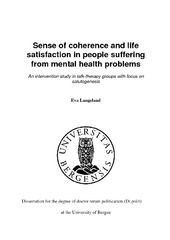| dc.contributor.author | Langeland, Eva | en_US |
| dc.date.accessioned | 2008-07-30T11:39:34Z | |
| dc.date.available | 2008-07-30T11:39:34Z | |
| dc.date.issued | 2007-11-16 | eng |
| dc.identifier.isbn | 978-82-308-0440-7 (print version) | en_US |
| dc.identifier.uri | https://hdl.handle.net/1956/2743 | |
| dc.description.abstract | Background: The increasing number of people who live in the community for many years with mental health problems (MHP) brings into focus the need for recovery within a coping, health promotion and life satisfaction perspective. Although the theory of salutogenesis provides generic understanding of how coping as a sense of coherence (SOC) may be created, and thus decisively determines the ability to recuperate, this theoretical perspective has not been explored sufficiently within research of people suffering from MHP. Aims: The main aim of the present study was to increase knowledge about therapy and assessment of MHP in a health promotion and life satisfaction perspective. This was done firstly when developing salutogenic therapy principles; secondly, in a randomized controlled trial investigating the effect of these principles on coping (SOC) with MHP; thirdly, by exploring quality of life among people with MHP compared with the general population; and fourthly, by investigating the utility of SOC versus mental symptoms as predictors for life satisfaction development. Method: The main sample consisted of 107 residents in the community who have MHP. In addition, a general population sample (n = 1893) was used as a comparison group for life satisfaction. The following different designs were used: a randomized controlled trial (Paper II), a cross-sectional comparative design (Paper III), and a prospective one-year follow-up design (Paper IV). The MHP sample answered a mailed questionnaire three times during a one-year period. The Sense of Coherence Questionnaire was used as a measure of coping, while life satisfaction was measured by the Quality of Life Scale, and the Symptom Checklist–90 was used for a description of the participants’ mental symptoms.Results: The results of this study show one way of developing salutogenic therapy principles. These were applied in talk-therapy groups and resulted in an increased SOC (the main outcome) among people with MHP compared with the control group. Further, the results reveal that the MHP group has significantly lower life satisfaction (corresponding to their high symptom load) than the general population, and that SOC can be identified as a predictor of change in life satisfaction over one year among people with MHP, as opposed to mental symptoms, which do not predict life satisfaction. Conclusion: This thesis shows one way of developing an intervention based on a theoretical framework, the theory of salutogenesis, and the significance of interventions based on salutogenic therapy principles in people with MHP. Further, this study indicates that improving SOC might provide important opportunities to improve these people’s low life satisfaction compared with the general population. Services for people with MHP should focus on enhancing SOC and life satisfaction, and on the role of SOC and life satisfaction as outcome variables in mental health care. | en_US |
| dc.language.iso | eng | eng |
| dc.publisher | The University of Bergen | eng |
| dc.relation.haspart | Paper I: Issues in Mental Health Nursin 28 (3), Langeland, Eva; Wahl, Astrid K.; Kristoffersen, Kjell; Hanestad, Berit R., Promoting coping: Salutogenesis among people with mental health problems, pp. 275 295. Copyright 2007 Informa Healthcare. Published by Taylor & Francis. The published version is available here: <a href="http://dx.doi.org/10.1080/01612840601172627">http://dx.doi.org/10.1080/01612840601172627</a> | en_US |
| dc.relation.haspart | Paper II: Patient Education and Counseling 62 (2), Langeland, Eva; Riise, Trond; Hanestad, Berit R.; Nortvedt, Monica W.; Kristoffersen, Kjell and Astrid K. Wahl, The effect of salutogenic treatment principles on coping with mental health problems A randomised controlled trial, pp. 212-219. Copyright © 2005 Elsevier Ireland Ltd All rights reserved. The published version is available here: <a href="http://dx.doi.org/10.1016/j.pec.2005.07.004">http://dx.doi.org/10.1016/j.pec.2005.07.004</a> | en_US |
| dc.relation.haspart | Paper III: Community Mental Health Journal 43(4), Langeland, Eva; Wahl, Astrid K.; Kristoffersen, Kjell; Nortvedt, Monica W. and Berit Rokne Hanestad, Quality of Life Among Norwegians with Chronic Mental Health Problems Living in the Community versus the General Population, pp. 321-339. Copyright 2007 Springer Netherlands. Abstract only. The full-text is not available due to publisher restrictions. The published version is available here: <a href="http://dx.doi.org/10.1007/s10597-006-9076-1">http://dx.doi.org/10.1007/s10597-006-9076-1</a> | en_US |
| dc.relation.haspart | Paper IV: Quality of Life Research 16(6), Langeland, Eva; Wahl, Astrid K.; Kristoffersen, Kjell; Nortvedt, Monica W.; Hanestad, Berit R., Sense of coherence predicts change in life satisfaction among home-living residents in the community with mental health problems: a 1-year follow-up study, pp. 939-946. Copyright 2007 Springer Netherlands. Abstract only. The full-text is not available due to publisher restrictions. The published version is available here: <a href="http://dx.doi.org/10.1007/s11136-007-9199-z">http://dx.doi.org/10.1007/s11136-007-9199-z</a> | en_US |
| dc.title | Sense of coherence and life satisfaction in people suffering from mental health problems : an intervention study in talk-therapy groups with focus on salutogenesis | en_US |
| dc.type | Doctoral thesis | |
| dc.subject.nsi | VDP::Medisinske Fag: 700::Helsefag: 800 | nob |
